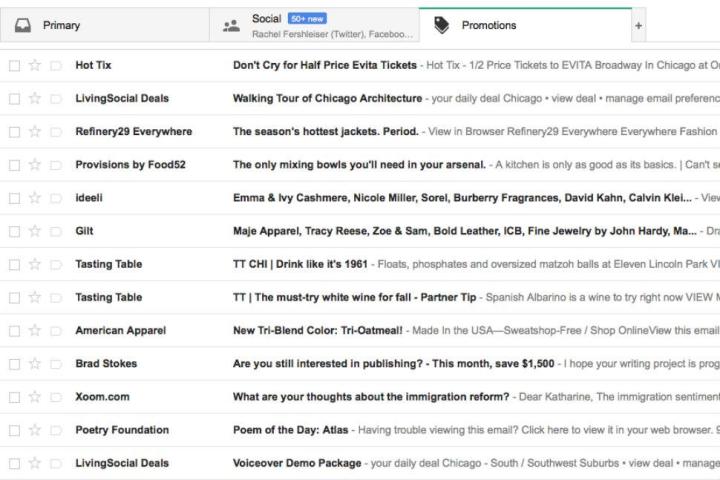
I had a lull in my schedule a few months ago and wandered past a spacious American Apparel in Midtown. I wasn’t going to buy anything, but it was during that week in the summer when the temperature went from scalding to crucifying, and I just wanted to soak up the air conditioning (and look at crop tops). Alas, my coolant-fueled reverie was interrupted approximately 37 seconds after I walked in by a preposterously trendy floor salesman.
“Would you like to sign up on our email list?” He looked earnest. Still, I said no, because when does anyone ever want to sign up for someone’s email list? Then he opened up the canvass bag in his hands and told me if I signed up for the email list I could have a free t-shirt. And thus, I ended up on American Apparel’s stupid freaking email list. And their ads promising disco pants and lace thong bodysuits started clogging up my inbox, arriving with dozens from other retailers who had somehow snookered me into putting myself on their lists over the years.
Google recently introduced a major change to Gmail that I, as a consumer, find fantastic. Instead of a single-stream inbox, Gmail is now separated into three tabs, one for your primary email, and others for social updates and promotional materials. This means you’ll never have to deal with Living Social again. It is magnificent for Gmail users who are easily enticed to signing up to lists but have no real interest in regularly visiting these retailers online shops.
But retailers, understandably, aren’t happy about this change. After all of their pestering checkout line entreaties and luring people with the promise of 15 percent off, the subscription lists they’ve amassed are now losing value.
The New York Times explored how retailers are resisting the change. Each company interviewed expressed dismay at Google “effectively classified their messages as junk mail.” And while services that manage mass emails reported only slight drop-off in the amount of emails opened since this change, the promotional tab could become a bigger problem for services like Gilt and Ideeli, which do time-sensitive sales and use e-mails to remind their customers to visit before the clock runs out. Users who formerly clicked on their promotional emails may not check their Promotions tab as regularly as they check their Primary tab, so they’ll miss the deals they otherwise might have purchased.
The Promotions tab is causing a drop-off, but as the New York Times article noted, mass email managing services found that so far the change has only resulted in a 1 percent decrease in opened promotional emails.
And talking to people who use Gmail, not everyone is completely ignoring the tab. Zach Shuster, 26, the medical programs manager for Smile Train, makes a point to check his Promotions tab. “But I’ll only open the email if it’s stuff I’ve asked for – concert calendars, online sales, et cetera,” he says.
David Marshall, 29, a consultant for Volvo in Gothenburg, Sweden, wasn’t into the separate tabs. “I removed the tabs and went back to the standard view,” he explains.
And some people who notice the Promotions tab take the time to clear it out. “I go through the emails and delete them. Stresses me out to have any unopened messages lingering,” says Kika Westhof, 26, a Seattle restaurant manager. Sure, she’s not clicking on the material, but she’s seeing it the same as she would if it arrived in her Primary tab.
So while many people are ignoring their Promotions (and Social) tabs, it’s not causing a huge change for retailers, possibly because such a big swath of people who they sent messages to in the first place were already ignoring them. And while the retailers profiled by the New York Times expressed concern, not everyone is wringing their hands.
Dating website PlentyOfFish isn’t worried, though its emails get shuffled into the Social tab. They’re more focused on mobile marketing, which is unaffected. “We don’t expect this change to affect mobile driven businesses like PlentyOfFish. 70 percent of our users access the site via one of our mobile apps which means the majority of our users are being brought back to the site through push notifications, not email notifications.” says founder and CEO of PlentyOfFish Markus Frind.
Though this new tab system is throwing some businesses for a loop, other companies like PlentyOfFish are focusing on alternative marketing tactics — a tactic that could serve other companies well. If the tabs end of making a bigger impact on sales than the initial reports suggest, it will be cause for alarm and a substantial shift in marketing strategies. But as it stands, the tabs are merely a minor hindrance for retailers — and remain a big win for consumers who want to ignore all promos and deals stuffing their inbox.


